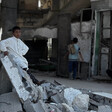The Electronic Intifada Podcast 23 February 2025
Pappé, one of the Israeli “New Historians” who helped reveal the truth about the 1948 Nakba using official archival sources, outlined trends which may lead to Israel’s collapse: a faltering economy, mass emigration and the global movements to hold Israel accountable. Referring to Israel’s collapse Pappé said, “The question is not if, but when and how.”
Support from fundamentalist Christians and new right-wing fascist parties in Europe “may slow down some of the processes I’m talking about, but they’re not going to stop them,” Pappé said.
”It’s a very dangerous and precarious moment in the history of modern Palestine,” the author of The Ethnic Cleansing of Palestine added. He warned that there are new rising powers in Israel which are incompetent and self-destructive. But before they self-destruct, they can still cause much more violence and repression.
Pappé draws hope from speaking to young politicians in Europe and the Arab world. He acknowledged how powerful political institutions work against movements for justice from the bottom-up but he “sees no alternative.” Pappé said of young people: “Even if they detest organizations and structures – they still need them, I think, to translate great visions and ideas into real politics on the ground.”Israel’s Exploitation of the Bibas Family
Last week, as discussed on the program, Hamas returned the bodies of Shiri Bibas and her young children Kfir and Ariel, as part of the ongoing ceasefire and prisoner exchange deal.
Hamas announced in November 2023 that Israeli airstrikes had killed Shiri Bibas and her children.
But as their bodies were returned, Israeli and US politicians have been using their story to incite renewed hatred against Hamas and Palestinians more generally.
In response to lurid stories in recent days about how the three died, including claims that they were murdered and mutilated by Hamas, the Bibas family issued a statement on 22 February saying that “The family has not received any such details from official sources.”
The Bibas family has also said they do not want any Israeli government officials to attend the funeral of the mother and her two children according to one report.
Will ceasefire phase two go ahead?
Contributing editor Jon Elmer reviewed the messages that fighters sent during the sixth prisoner exchange on 15 February to Israel, Palestinians in Gaza and the wider Arab world.
Elmer emphasized that prisoner exchanges are among the few times that Israelis see Gaza and get messages from Palestinians.
Saturday 22 February was supposed to be the end of phase one of the ceasefire agreement, when Hamas would release six Israelis and Israel would release 620 Palestinians.As it turned out, Hamas released the Israelis as planned, but Israel reneged on its part of the deal and had not released any Palestinians by Sunday.
There was already uncertainty about what would happen next. “Negotiations for phase two were supposed to start over three weeks ago but still have not,” Elmer noted.
Israel steps up West Bank violence
In her news brief, associate editor Nora Barrows-Friedman highlighted developments across Palestine, including a report by Oxfam warning that water in Gaza is less than seven percent of pre-genocide levels. This is causing many problems including an increased risk of disease.
“The picture remains extremely bleak and dangerously critical,” the development charity said.
Israel has also stepped up its violence in the occupied West Bank, as associate editor Tamara Nassar reported this week.That includes attacking several schools in refugee camps across the West Bank as part of Israel’s plan to close the operations of UNRWA, the UN agency for Palestine refugees.
New details about Swiss arrest of Ali Abunimah
Meanwhile, executive director Ali Abunimah spoke about new developments following his arrest in Switzerland and expulsion last month, where he traveled to give a talk about the situation in Palestine.
New documents reveal that Swiss federal police (Fedpol), intelligence services and the migration authority initially rejected a ban.
“It is the task of the state not merely to tolerate the guaranteed pluralism of opinions, but to protect it,” Fedpol concluded in its official response to the Zurich cantonal police, which had requested the ban on Abunimah. “As long as no concrete violent extremist activities threaten the security of Switzerland, no entry bans can be issued under the authority of Fedpol.”
But the very next day, Fedpol reversed itself and issued a ban based on exactly the same claims by the Zurich cantonal police that it had rejected a day earlier.
As associate editor Asa Winstanley reported, the involvement of a notoriously pro-Israel politician, Zurich security director Mario Fehr, may have played a role in the unexplained reversal.
Abunimah said he hopes the legal action he is taking will reveal the facts and hold Swiss authorities accountable. He observed that many governments and universities are attempting to silence those who speak up about Palestine. “They need to know that we’re not easy targets. We will stand and fight.” You can watch the program on YouTube, Rumble or Twitter/X, or you can listen to it on your preferred podcast platform.Tamara Nassar produced and directed the program. Michael F. Brown contributed pre-production assistance and this writer contributed post-production assistance.
Past episodes of The Electronic Intifada Livestream can be viewed on our YouTube channel.





Comments
Regarding the Bibas family:
Permalink JeJ replied on
Regarding the Bibas family: articles regarding allegations of the Abu Kabir Forensic Institute falsifying pathology reports can be found on Haaretz.
Add new comment